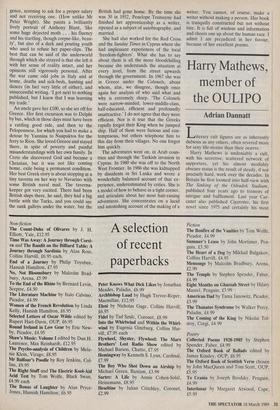Years of living dangerously
Peter Levi
A WRITER OR SOMETHING by Penelope Tremayne
Unwin Hyman, £12.95, pp.305
There are a few books where the in- terest of the story overrides all incoherence of style or personality, and a good many where the style and the person carry one easily over a wasteland of subject-matter, but happy are those writers whose best subject-matter is themselves and their adventures. Penelope Tremayne's poems, let alone her prose books, have already proved what a fine writer she has become, and shown how inextricable this is from her personality and its roots, but the resulting criticism of her has not always been just, because her gallant character and plain speaking have sometimes provoked the political prejudices of her critics. She does take up causes, but why not? They are well chosen and her detailed observations are devastating. As a writer, she is admirably entertaining and a courteous companion.
Her life has been enthralling simply as an adventure story. Her father was a sailor, an early airman and a war hero, her mother taught Braille to blind soldiers, and by page six she herself is in a bucket suspended by a rope over a drop of 15 feet in Fiesole. I wish the pages on childhood were much longer than they are; they have the nutty quality of some marvellous letter. What I liked best was the dog sicking up the German governess's vest, with the subtly suggested world of childish honour that surrounded this apocalyptic event. Nor is it every little girl who can boast of lion cubs and a kinkajou. But her father was posted to London, which to her was Hades, a rather exact analogy if one remembers the fog and grime of those years, and her Catholic monastic school was an intellectual step backwards. Still, on her last day at school she found she loved it and this book is well enough written for one to believe her.
The second war found her in Singapore, but she escaped and got a job as a hospital nurse. The hardness of the work and the humiliation of the bullying recall an atmos- phere I just remember. Nothing in this book so far would happen in the same way today. The hospital sacked her, and on the strength of having censored some Italian letters in Singapore, she went into intelli- gence, scorning to ask for a proper salary and not receiving one. (How unlike Mr Peter Wright). She paints a brilliantly lively portrait of Anthony Blunt, 'like some huge dejected moth . . . his fluency and his startling, though corpse-like, beau- ty', but also of a dark and pouting youth who used to refuse her paper-clips. The best that can be said of the underworld through which she strayed is that she left it with her sense of reality intact, and her opinions still vigorously personal. After the war came odd jobs in Italy and at home, deaths and sick-beds, hunting and dances (in fact very little of either), and unsuccessful writing. 'I got next to nothing published, but I knew that I was learning my trade.'
An uncle gave her £100, so she set off for Greece. Her first excursion was to Delphi by bus, which in those days must have been a rattling good ride, and then to the Peloponnese, for which you had to make a detour by Yannina to Naupaktos for the ferry to Rion. She loved Greece and stayed there, in spite of poverty and painful misunderstandings with her own family. In Crete she discovered God and became a Christian, but it was not like coming home, exile being a permanent condition. Her best Greek story is about stopping at a tiny taverna on her way to Navarino with some British naval mail. The taverna- keeper got very excited. There had been British ships there, he said, they had a big battle with the Turks, and you could see the sunk galleys under the water, but the British had gone home. By the time she was 30 in 1952, Penelope Tremayne had finished her apprenticeship as a writer, ripened as a subject of autobiography, and married.
She had also worked for the Red Cross and the Sunday Times in Cyprus where she had unpleasant experiences of the local `freedom-fighters'. What she has to say about them is all the more bloodchilling because she understands the situation at every level, from the street upwards through the government. In 1967 she was in Greece under the Colonels, about whom, alas, we disagree, though once again her analysis of who said what and why is extremely sharp. 'The Colonels were narrow-minded, lower-middle-class, half-educated, efficient and profoundly unattractive.' I do not agree that they were efficient. Nor is it true that the Greeks rapidly forgot their King when he jumped ship. Half of them were furious and con- temptuous, but others telephone him to this day from their villages. No one forgot him quickly. The adventures went on, in Arab coun- tries and through the Turkish invasion in Cyprus. In 1980 she was off to the North West Frontier. In 1986 she was kidnapped by dissidents in Sri Lanka and wrote a wonderfully balanced account of that ex- perience, underestimated by critics. She is a model of how to behave in a tight corner, and articulate about her most hair-raising adventures. She concentrates on a lucid and astonishing account of the making of a writer. You cannot, of course, make a writer without making a person. Her book is tranquilly constructed but not without bite. It is full of wisdom and information and cheers one up about the human race. I admit I am prejudiced in her favour, because of her excellent poems.



























































 Previous page
Previous page